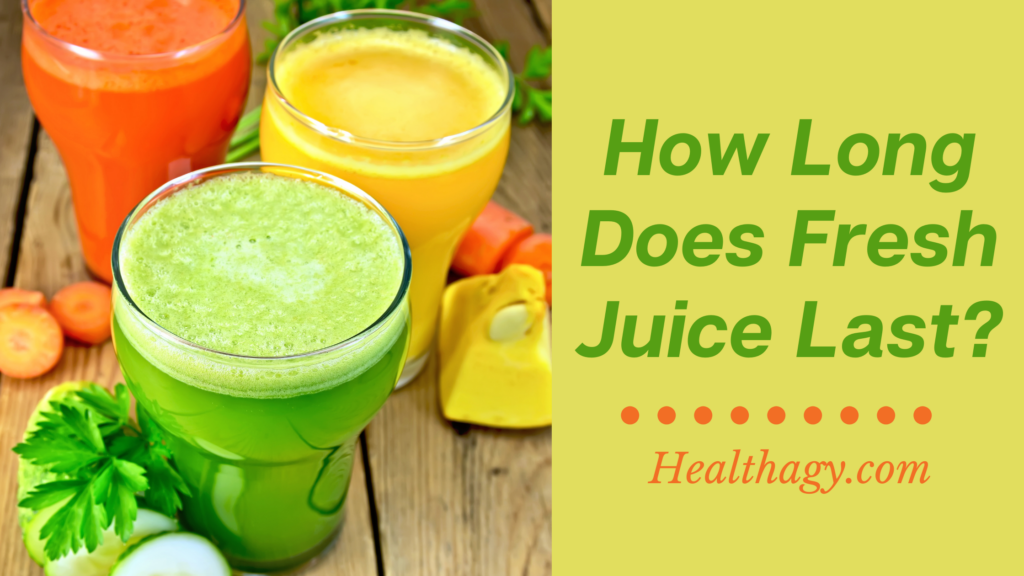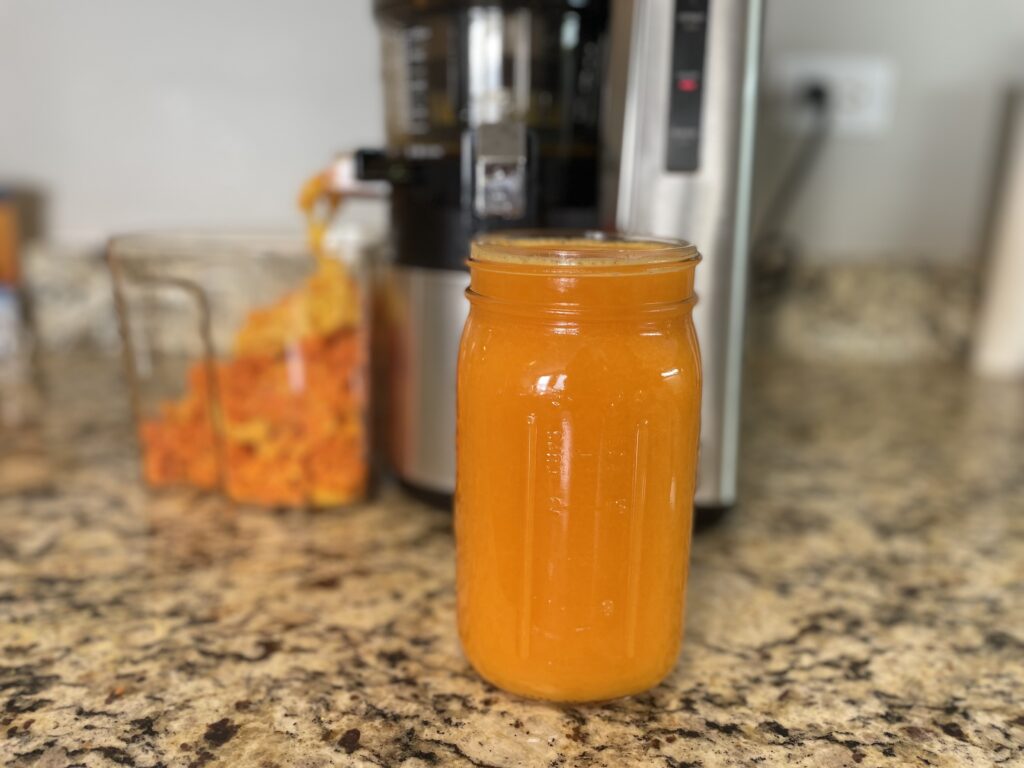
Do you enjoy juicing as much as I do? Juicing is such a great way to get a plethora of vitamins and minerals each day. We also know that fresh juice from a juicer is the best in taste and quality. It beats out any store-bought juice that was made days or weeks ago and be full of preservatives or pasteurized.
Juicing takes time, though, and what do you do if you don’t have time to juice? Or you haven’t finished the juice you took the time to make? You know fresh juice is the best, but how long does fresh juice last? And what is the best way to store it, so you are reaping all the benefits it has to offer? In this post, I’ll go into further detail about all that and more. Keep reading!
How Long Does Fresh Juice Last?
The freshness of your juice depends on what kind of juicer you made the fresh juice with and how it is stored. We’ll dive deeper into the details around those variables later in this post.
The short answer is assuming you store your juice in an airtight container in the refrigerator; it should last the specified number of hours listed below based on the type of juicer used.
Centrifugal Juicer: 12-24 hours
Masticating Juicer / Slow juicers: 48 hours
Citrus or Handheld Juicer: 72 hours
Twin Gear Juicer: 72 hours
Hydraulic Juice Press / Cold Press Juicer (commercial quality juicer): 72 hours
Type of Juicer and the Oxidation Process
Due to the oxidation process, the juice’s shelf life depends on how it is stored and what type of juicer was used to juice it.
Oxidation occurs when fruit and/or vegetable juice is exposed to air. It causes a deterioration in the quality of the juice. Oxidation is evident on an apple after it’s been sliced; the enzymic browning happens shortly after is oxidation. It can be slowed down using an acid such as lemon juice.
Juice is even more susceptible to oxidation than fresh-cut produce is because juicing breaks down the cell walls of the produce. This process allows the nutrients to be exposed to air, heat, and light. Combine these factors with time, and nutrient degeneration happens. This is why it’s best to drink juices immediately after juicing or within the timetable for the type of juicer used.
There are three main types of juicers, and each operates at a different speed. Faster-speed juicers cause the juice to oxidize faster than slow-press juicers.
A centrifugal juicer operates at high speeds, which causes juice to oxidize faster than juice does with slower-speed juicers.
Masticating juicers are also known as slow juicers, run at slower speeds, so you get less oxidation and more nutrients. Twin gear juicers are also known as triturating juicers and operate at even slower speeds than masticating juicers.
If you’ve purchased juice made at a juicery or juice bar, they may have a high-end hydraulic juice press or cold-press juicer. These are the best juicer, the gold standard; the juice from these juicers will be very fresh for up to three days. You could maybe even push the fourth day out of it if needed.

How to Best Preserve Fresh Juice
The best way to preserve fresh juice is to store it in an airtight container such as airtight mason jars or glass bottles. Fill the container as close to the top as possible before securing the cap. This helps to reduce oxygen exposure and minimize oxidation. You also want to store it in the refrigerator to help minimize oxidation.
Another tip to help minimize oxidation is adding juice from citrus fruits such as grapefruit, lemon, or lime juice. These citric juices can help reduce nutrient loss by boosting vitamin C, citric acid, and antioxidants that act as natural preservatives. This helps reduce oxidation and browning in the same way that squeezing lemon or apple slices an open avocado slows the browning.
Nutritional Value in Juice Over Time
As juice is exposed to air and light, the oxidation process affects the nutrient content of the juice. This is why the way juice is processed and stored affects the nutritional content of the juice.
Vitamin C is particularly prone to oxidation and may be lost over a shorter period of time than other vitamins. Limiting the exposure juice has to air helps preserve the nutritional value of the juice. This is why storing juice in an airtight container in the refrigerator is the best storage option.
Fresh juice right from the juicer will always have the most nutritional value and slowly degrade in nutritional value over time and air exposure. However, if making juice the night before allows you fresh juice every morning, that’s certainly a much better choice than not having any fresh juice.
3 Tips for Juicing on a Busy Schedule
The time is the biggest hangup I find people (including myself) struggle with when it comes to juicing. The time to wash the ingredients, chop them, feed them through the juicer and then clean up. However, I’ve found juicing helps keep my energy levels up, and my overall health is better, so the time investment is well worth it.
I’m still always looking for ways to make the juicing process quicker and easier. Below I’ve listed three tricks that really help me make sure I have fresh juice every day, regardless of how busy I am.
1. Prepare Produce in Advance
The first tip is to wash and cut all your produce the night before and store it in a container so in the morning all you are doing is juicing and cleaning the juicer. And if you are really in a time crunch, after juicing, soak the juice parts to wash later. This has helped tremendously in making juicing a quick process each morning.
2. Batch Juicing
The easiest way to have homemade juice ready is to batch juice-making ahead of time. Carve out time on a Sunday afternoon and juice ahead for the next week or so. This can also be a great way to take advantage of in-season produce or sales. Depending on when you will be consuming it, you can have it ready to go in the refrigerator for the next day or two (depending on the type of juicer you have) and/or choose to freeze it for later use. See more details on freezing juice below.
3. Freeze Juice
Freezing juice is a great way to always have juice prepared. I’ve found this option to work really well and provide different types of juice throughout the week. When it comes to freezing juice, look for glass jars that are freezer safe, such as Ball mason jars or plastic containers are always an option too. Make sure you leave about a gap of air at the top when filling the bottle with juice, as the liquid will expand when it freezes. If you don’t leave space for expansion, you will end up with broken jars and a loss of juice.
When it comes to thawing your juice, put your frozen juice in the refrigerator the night before so it is ready for you to drink in the morning.
Freezing Juice
Freezing juice is a great option if you’ve made too much juice, batching your juice, or you have produce you don’t want to go to waste. Freezing juice may result in some nutritional loss, but it doesn’t seem to be that substantial. In this study on frozen orange juice, it was found that after 24 months, 19% of the vitamin C in the juice was lost. I would imagine the loss of other nutrients is somewhat similar. It’s also uncertain if there are fewer nutrients lost when freezing for only weeks or days at a time.
When it comes to having juice or not having juice as part of your daily routine, freezing juice is the next best option to fresh juice as the majority of nutrition is retained over a period of time. The same thing is true with fresh fruits and vegetables; if you can’t have them fresh, frozen ones are the next best option.
Freezing is also a much better option than pushing the time limits on refrigerated juice. Bad bacteria also start to grow over time on fresh juice left in the refrigerator or at room temperature, regardless of how tightly sealed the container is.
While the study mentioned above looked at frozen juice stored over a two-year time period, I wouldn’t really recommend storing the juice that long as the quality and taste may diminish with freezer burn. I find most frozen food and juice are best consumed within six months for taste and quality.
Key Takeaways
Drinking juice fresh is always the best option. The shelf life of fresh juice depends on the type of juicer used and how it is being stored. Storing juice in an airtight container in the refrigerator helps to reduce oxidation. Freezing juice is the next best option for preserving fresh juice that can not be consumed within a day or two.
Cheers to Great Health!
Karla Kueber is a Certified Evidence Based EFT Practioner and Health Coach, with a double Masters Degree in Education. She works with people to overcome emotional eating, curb cravings, and overcome resistance to eating new healthy foods. You can learn more about coaching with her here.